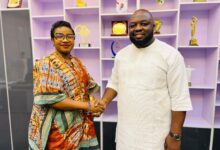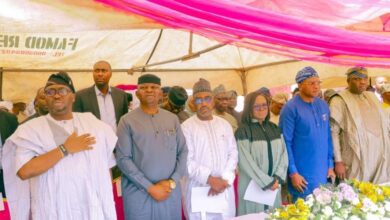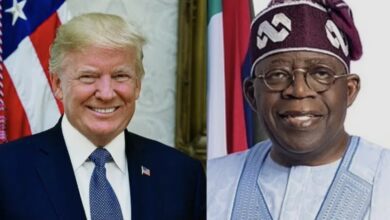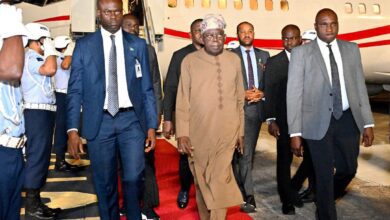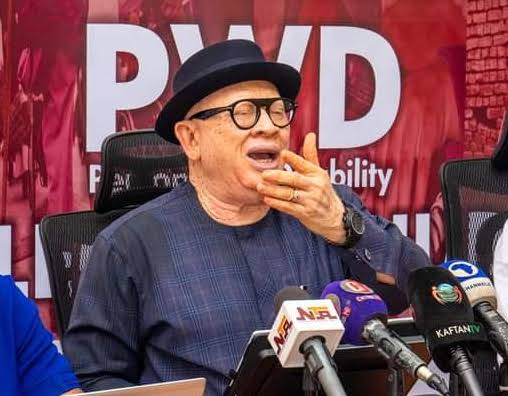
Persons With Disabilities (PWDs) have called on the Federal Government of Nigeria to implement existing disability laws, including modification of public facilities, employment, and other forms of inclusion.
This follows recent investigations carried out by the Premium Times, which alleged various degrees of discrimination and non-inclusivity of some blind students at 3 Nigerian universities despite the existence of disability rights law in the country.
The CEO/Founder of TAFAfrica (Formerly The Albino Foundation), Jake Epelle, led the call for a holistic inclusion of PWDs and implementation of disability law during a radio programme, PUBLIC CONSCIENCE, produced by the Progressive Impact Organization for Community Development, PRIMORG, on Wednesday in Abuja.
Epelle revealed that PWDs in their millions are still grappling with social and economic challenges and require serious government intervention while identifying a lack of political will as one of the main reasons why the government continues to struggle with the implementation of existing disability law.
He noted that the community of persons with disabilities is grateful for establishing the National Commission for Persons With Disability (NCPWD) as part of the Discrimination Against Persons With Disabilities (Prohibition) Act. Still, he lamented its non-impact on PWDs due to the government’s non-implementation, underfunding, and lack of political will.
“Every responsible government should ensure that the most marginalized are cared for. That’s a life of contribution; whether you are a PWD or not, you have the responsibility to look out for the most vulnerable in life. The political will to implement disability law is not there.
“The situation is that we have a disability law, but we are struggling with the challenges of implementation, and the situation is that we have more than 35 million people who require intervention, and they are not getting a holistic intervention. Also, know that a lot of buildings and public structures can hardly be accessed by persons with disabilities.
“There is a lot more that can be done to an extent; the political will is a challenge, and the inclusion of people with disability, we are still not there. So, there must be a deliberate move to ensure the community of people with disability sit at the table and are part of the discussion, especially in governance. Inclusion should be holistic,” he stated.
Epelle, reflecting on the establishment of the National Disability Commission, revealed that it is challenged by funding and poor personnel deployment.
“The greatest problem of NCPWD is that it is grossly underfunded. They send people from other ministries who have no business with disability matters, so the Commission is struggling with capacity because they send people who are not disability experts to work in disability establishments,” he stated.
On her part, the Executive Director of the Mavic Impact Foundation and Global Secretary of the Network of Women with Disabilities, Barr. Mary Victor-Magaji tasked the government with deliberate inclusion while raising serious concerns over the continued discrimination and stigmatization of PWDs.
Victor-Magaji also urged President Bola Tinubu’s administration to enforce disability laws meant to improve the treatment of PWDs in society. This includes economic empowerment, job placement, transportation, and easy access to public facilities, among other things.
She called on Nigerians to show love and empathy for persons with disabilities as they are not the cause of their predicament while noting that individuals assisting PWDs remain a function of humanity, which is sadly on the decline in Nigerian society.
“To the government, I’ll say we have the law and are grateful for it, but it’s one thing to have a law. It’s another thing to implement the law. We want the government to begin to enforce these laws that have been enacted.
“When the law is not enforced, it’s like having a toothless dog. So, we need people to understand, and the government is capable of doing so. All we need is political will for the government to push for disability inclusion – if this is done, I am certain that disability inclusion will take a new shape.
“Discrimination and stigma are more like continuous problems that persons with disability face although on varying degrees. I say that because there are a lot of sensitizations going on, there are a lot of advocacies going on, and so more people are becoming aware of their rights. Many people are now beginning to know that there is such a thing as disability rights.
“So, for those people, discrimination and stigma have probably reduced. But people who are yet to know do not understand the complexity of disability, and so they take it in different ways. Some people think it’s a religious punishment. Some people think it’s a cultural anomaly and different types of stereotypes and perceptions. Still, work is ongoing by different organizations in the disability community to ensure that sensitization continues.
Disability expert Chris Obiora, speaking on the difficulties PWDs face daily, joined calls for the government to address the inaccessibility of many public facilities for persons with disabilities while urging the Disability Commission to live up to its responsibilities.
His words: “It will shock you that those people that have physical defects like those on wheelchairs have not been able to access some of the public buildings or some of them suggest the option of being carried, and that option on its own is a risk to life.
“So it has a sustaining effect of PWDs because a lot of us who want to go into businesses with some organizations, it affects us because we will not be able to do what we need to do, so these are some of the challenges, and it’s affecting the economic wellbeing of PWDs.
“Their (PWDs) situation is not their making, but because of the system, it is difficult for any person going to a business to thrive because you will not be able to access most of the buildings to showcase yourself or market whatever you want to sell. Most of the high-rising structures have no ramp”.
On the role of NCPWD, Obiora added: “The disability law empowers the Commission with the responsibility of ensuring that the law is complied with. So the Commission has rights to get the owners of some of these public buildings to make their facilities accessible to PWDs and has the right to sue them if they don’t make these provisions for the disability community.”


